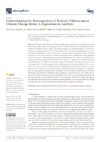Identificador persistente para citar o vincular este elemento:
https://accedacris.ulpgc.es/jspui/handle/10553/77093
| Título: | Understanding the heterogeneity of tourists’ choices under climate change risks: a segmentation analysis | Autores/as: | Lam González, Yen Elizabeth García Galindo, Carmen González Hernández, Matías Manuel León González, Carmelo Javier |
Clasificación UNESCO: | 531290 Economía sectorial: turismo 2502 Climatología |
Palabras clave: | Climate Change Islands Tourism Segmentation Tourism Resilience Tourist Behaviour |
Fecha de publicación: | 2021 | Publicación seriada: | Atmosphere | Resumen: | This paper undertakes a data-driven segmentation analysis on tourists’ choice of island destinations in the context of a changing climate. To this end, 2528 tourists visiting ten European islands in the Mediterranean, Baltic, and Atlantic regions were posed hypothetical situations in which diverse impacts caused by CC (i.e., beach loss, heatwaves, storm intensification, etc.) were affecting the islands being visited. In each scenario, tourists’ responses ranged from stay on the island to change to an alternative destination. Cluster analysis allowed the identification of four segments: (1) LO-loyal oriented—tourists willing to stay on the island despite any climatic event (in this group, tourists would often change the travel date); (2) RA-risk-averse—tourists who would always avoid islands affected by CC; (3) WIL-risk-specific—a segment of tourists with a special aversion to the risks associated with wildlife disappearance and damage to infrastructure, and (4) 3S-sun, sea and sand seekers—tourists who would always avoid visiting islands where CC induced effects are related to beach loss or extreme events. Further analysis is dedicated to comparing segments in regard to their sociodemographic characteristics, the image of the island, and the importance given to the protection of environmental attributes when choosing an island destination. The results alert us about the climate-specific risks and tourist profiles that are relevant to explaining changes in the tourism geography and seasonality of islands. The findings are useful for providing operational marketing recommendations for destination managers, especially for taking competitive advantage of climate services, and for prevention and responsiveness management strategies. | URI: | https://accedacris.ulpgc.es/handle/10553/77093 | ISSN: | 2073-4433 | DOI: | 10.3390/atmos12010022 | Fuente: | Atmosphere [EISSN 2073-4433], v. 12 (1), p. 1-21, (Enero 2021) |
| Colección: | Artículos |
Citas SCOPUSTM
5
actualizado el 08-jun-2025
Citas de WEB OF SCIENCETM
Citations
7
actualizado el 25-ene-2026
Visitas 10
172
actualizado el 11-ene-2026
Descargas
105
actualizado el 11-ene-2026
Google ScholarTM
Verifica
Altmetric
Comparte
Exporta metadatos
Los elementos en ULPGC accedaCRIS están protegidos por derechos de autor con todos los derechos reservados, a menos que se indique lo contrario.
